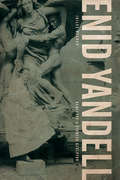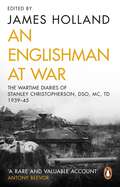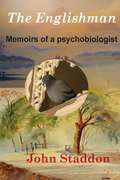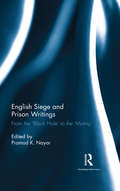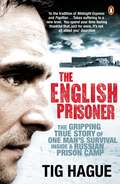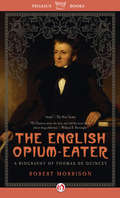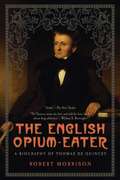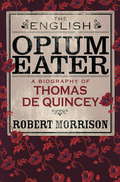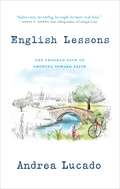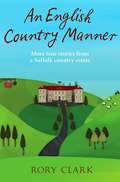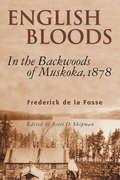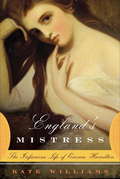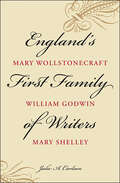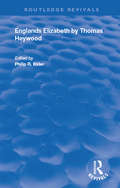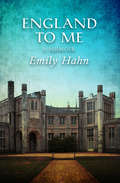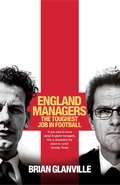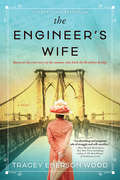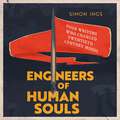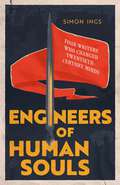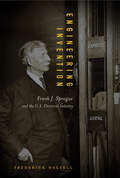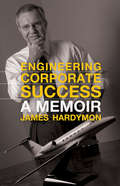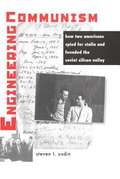- Table View
- List View
Enid Yandell: Kentucky's Pioneer Sculptor (Topics in Kentucky History)
by Juilee DeckerThe life and work of a sculptor who pushed both aesthetic and social boundaries at the turn of the twentieth century is explored in this in-depth study.Working in the late nineteenth and early twentieth centuries, Louisville-born sculptor Enid Yandell developed a distinctly physical and masculine style that challenged the gender norms of artistic practice. An award-winning sculptor with numerous commissions, she was also an activist for women's suffrage and other political movements. This study examines Yandell's evolution from a young, Southern dilettante into an internationally acclaimed artist and public figure.Yandell found early success as one of a select group of female sculptors at the World's Columbian Exposition in Chicago in 1893. She was then commissioned to create a twenty-five foot figure of Pallas Athena for Nashville's Centennial Exposition in 1897. Yandell's command of classical subject matter was matched by her abilities with large-scale, figurative works such as the Daniel Boone statue in Cherokee Park, Louisville.Part of the art worlds of New York and Paris, Yandell associated with luminary sculptors like Frederick MacMonnies and Auguste Rodin. She became one of the first female members of the National Sculpture Society in 1898. This authoritative study explores the many ways in which Yandell was a pioneer.
An Englishman at War: The Wartime Diaries of Stanley Christopherson DSO MC & Bar 1939-1945
by Stanley Christopherson‘An astonishing record...There is no other wartime diary that can match the scope of these diaries’ James Holland‘An outstanding contribution to the literature of the Second World War’Professor Gary SheffieldFrom the outbreak of war in September 1939 to the smouldering ruins of Berlin in 1945, via Tobruk, El Alamein, D-Day and the crossing of the Rhine, An Englishman at War is a unique first-person account of the Second World War. Stanley Christopherson’s regiment, the Sherwood Rangers Yeomanry, went to war as amateurs and ended up one of the most experienced, highly trained and most valued armoured units in the British Army. A junior officer at the beginning of the war, Christopherson became the commanding officer of the regiment soon after the D-Day landings. What he and his regiment witnessed presents a unique overview of one of the most cataclysmic events in world history and gives an extraordinary insight, through tragedy and triumph, into what it felt like to be part of the push for victory.
The Englishman: Memoirs of a Psychobiologist
by John Staddon"Although I have been basically an academic for most of my life, the way I got there has taken some surprising turns. The first four chapters of this memoir describe what I can remember and discover about my early life: an unsuspected ancestry, fun in WW2 London, comical schooldays, and a spell in colonial Africa interrupting a wobbly college career at the end of which I left England for America. In the US I followed again a slightly erratic graduate-school trajectory that ended up in a Harvard basement."This is not just a witty transatlantic autobiography from a talented English working-class kid who made his name in the USA but also a learned and entertaining romp through the subject he has made his own. Growing up in a modest odd family out in wartime England, and with a natural resistance to regimentation, John Staddon was the precocious self-driven polymath who first studied chemical engineering but switched to psychology because there were only four or five classes a week. By way of his wide-ranging interests in biology, artificial intelligence, economics, philosophy and behavioural neuroscience, John Staddon introduces his important work on how animals learn. He discusses the still relatively new and exciting field of behavioural psychobiology, explains theoretical research on choice and interval timing and debates so-called superstition in the learned behaviour of pigeons, rats, fish - and people. Here is a most entertaining life story interwoven with expansive thoughts across the marvellously wide spectrum of behavioural psychology.
English Siege and Prison Writings: From the ‘Black Hole’ to the ‘Mutiny’
by Pramod K. NayarThis volume brings together an unusual collection of British captivity writings – composed during and after imprisonment and in conditions of siege. Writings from the ‘Mutiny’ of 1857 are well known, but there exists a vast body of texts, from Afghanistan, Sri Lanka and Burma, and the Indian subcontinent, that have rarely been compiled or examined. <P><P>Written in anxiety and distress, or recalled with poignancy and anger, these siege narratives depict a very different Briton. A far cry from the triumphant conqueror, explorer or ruler, these texts give us the vulnerable, injured and frightened Englishman and woman who seek, in the most adverse of conditions, to retain a measure of stoicism and identity. From Robert Knox’s 17th-century account of imprisonment in Sri Lanka, through J. Z. Holwell’s famous account of the ‘Black Hole’ of Calcutta, through Florentia Sale’s Afghan memoir, and Lady Inglis’s ‘Mutiny’ diary from Lucknow, the book opens up a dark and revealing corner of the colonial archive. <P><P>Lucid and intriguing, this book will be of great interest to scholars and researchers of modern South Asia, colonial history, literary and culture studies.
The English Prisoner: The Gripping True Story Of One Man's Survival Inside A Russian Prison Camp
by Tig HagueIn July 2003 young Englishman Tig Hague was on a routine business trip to Moscow when he was arrested at the airport. Within hours he was accused of a major crime. Next, he was tried and transported hundreds of miles to the remote, forsaken wastes of Mordovia.And prison camp Zone 22.Sentenced to spend the next four years there, every day was a struggle against disease, freezing temperatures, malnutrition, the unpredictable, sometimes terrifying behaviour of the camp guards and his fellow prisoners.But, most of all, it was a fight to ensure his own psychological survival.Only the thought of his girlfriend Lucy, fighting Russia's corrupt and labyrinthine legal system, kept Tig sane - and gave him a reason to see each day to its end.The English Prisoner is an extraordinary story of endurance, as one man - plucked from his normal, everyday life - is forced to reach deep inside himself to survive life in one of the bleakest outposts in the world: Russia's vast and unforgiving 'forgotten zone'.
The English Opium Eater
by Robert MorrisonA masterful biography of one of England's most notorious literary figuresAuthor of the scandalous Confessions of an English Opium-Eater, Thomas De Quincey (1785-1859) has long lacked a full-fledged biography. His friendships with leading poets and men of letters in the Romantic and Victorian periods--including William Wordsworth and Samuel Taylor Coleridge--have long placed him at the center of nineteenth century literary studies. His writing was a tremendous influence on Edgar Allan Poe, Charles Dickens, and William Burroughs. De Quincey is a topical figure for other reasons, too: a self-mythologizing autobiographer whose attitudes to drug-induced creativity and addiction strike highly resonant chords for a contemporary readership. Robert Morrison's biography passionately argues for the critical importance and enduring value of this neglected icon of English literature.
The English Opium-Eater: A Biography of Thomas De Quincey
by Robert MorrisonA masterful biography of England's most notorious literary figure. Author of the scandalous Confessions of an English Opium-Eater, Thomas De Quincey (1785-1859) has long lacked a full-fledged biography. His friendships with leading poets and men of letters in the Romantic and Victorian periods-- including William Wordsworth and Samuel Taylor Coleridge--have long placed him at the center of nineteenth century literary studies. His writing was a tremendous influence on Edgar Allan Poe, Charles Dickens, and William Burroughs. De Quincey is a topical figure for other reasons, too: a self-mythologizing autobiographer whose attitudes to drug-induced creativity and addiction strike highly resonant chords for a contemporary readership. Robert Morrison's biography passionately argues for the critical importance and enduring value of this neglected icon of English literature.
The English Opium-Eater: A Biography of Thomas De Quincey
by Robert MorrisonDefinitive life of the author of CONFESSIONS OF AN ENGLISH OPIUM-EATER, journalist, political commentator and biographer.Thomas De Quincey's friendships with leading poets and men of letters in the Romantic and Victorian periods - including William Wordsworth, Samuel Taylor Coleridge and Thomas Carlyle - have long placed him at the centre of 19th-century literary studies. De Quincey also stands at the meeting point in the culture wars between Edinburgh and London; between high art and popular taste; and between the devotees of the Romantic imagination and those of hack journalism. His writing was a tremendous influence on Edgar Allan Poe, Charles Dickens, William Burroughs and Peter Ackroyd.De Quincey is a fascinating (and topical) figure for other reasons too: a self-mythologizing autobiographer whose attitudes to drug-induced creativity and addiction strike highly resonant chords for a contemporary readership. Robert Morrison's biography passionately argues for the critical importance and enduring value of this neglected essayist, critic and biographer.
The English Opium-Eater: A Biography of Thomas De Quincey
by Robert MorrisonDefinitive life of the author of CONFESSIONS OF AN ENGLISH OPIUM-EATER, journalist, political commentator and biographer.Thomas De Quincey's friendships with leading poets and men of letters in the Romantic and Victorian periods - including William Wordsworth, Samuel Taylor Coleridge and Thomas Carlyle - have long placed him at the centre of 19th-century literary studies. De Quincey also stands at the meeting point in the culture wars between Edinburgh and London; between high art and popular taste; and between the devotees of the Romantic imagination and those of hack journalism. His writing was a tremendous influence on Edgar Allan Poe, Charles Dickens, William Burroughs and Peter Ackroyd.De Quincey is a fascinating (and topical) figure for other reasons too: a self-mythologizing autobiographer whose attitudes to drug-induced creativity and addiction strike highly resonant chords for a contemporary readership. Robert Morrison's biography passionately argues for the critical importance and enduring value of this neglected essayist, critic and biographer.
English Lessons: The Crooked Path of Growing Toward Faith
by Andrea LucadoThe Questions Would Teach Her More Than the Answers It wasn’t long after arriving in Oxford for graduate school that twenty-two-year-old Andrea Lucado – preacher’s daughter from Texas - faced not only culture shock, a severe lack of coffee, but also some unexpected hard questions: Who am I? Who is God? Why do I believe what I believe? “So many nights in Oxford, I felt like the details of my faiths were getting fuzzier. Nights turned restless with the questions and the thoughts. I questioned God’s existence and the doubt, it was getting into my bones….” In this engaging memoir, Andrea speaks to all of us who wrestle with faith, doubt, and spiritual identity. Join Andrea as she navigates the Thames River, the Oxford Atheist Society, romance in ancient pubs—and a new perspective on who God is. As Andrea learned, sometimes it takes letting go of old ideas to discover lasting truth.
An English Country Manner: More true stories from a Suffolk country estate
by Rory ClarkJames Aden has his hands full when he leaves the comparative sanity of a job on an estate in Scotland when his wife inherits a farm in Suffolk. To supplement the income from the farm, he takes a job as an agent on Sir Charles Buckley's vast estate. The list of problems, and problematic characters, that he has to deal with is virtually endless with rogue chimney pots, unsavoury tenants and delinquent sheep giving him frought days and sleepless nights. There's no point in counting sheep to get to sleep when they simply won't do as they're told. Then there's the farm secretary, Gail, whose turbulent love life provides James with even more headaches than the troublesome sheep, without even the prospect of a decent Sunday roast to look forward to once the troublemakers have been put out of their misery!
An English Country Manner: More true stories from a Suffolk country estate
by Rory ClarkJames Aden has his hands full when he leaves the comparative sanity of a job on an estate in Scotland when his wife inherits a farm in Suffolk. To supplement the income from the farm, he takes a job as an agent on Sir Charles Buckley's vast estate. The list of problems, and problematic characters, that he has to deal with is virtually endless with rogue chimney pots, unsavoury tenants and delinquent sheep giving him frought days and sleepless nights. There's no point in counting sheep to get to sleep when they simply won't do as they're told. Then there's the farm secretary, Gail, whose turbulent love life provides James with even more headaches than the troublesome sheep, without even the prospect of a decent Sunday roast to look forward to once the troublemakers have been put out of their misery!
English Bloods: In the Backwoods of Muskoka, 1878
by Frederick de la Fosse Scott D. ShipmanFarming in the Canadian backwoods in the late 1800s was a prospect that enticed many young Englishmen to cross the Atlantic. One such fellow was Frederick de la Fosse, whose well-meaning uncle paid £100 per annum for his young nephew to serve as a farm pupil in the northern reaches of Muskoka. Some years later, de la Fosse, under the pseudonym of Roger Vardon, wrote an illuminating and humorous biographical account of the trials and tribulations of the "English Bloods," the local epithet attached to these young lads attempting to hone farming skills in a land never intended to be agricultural. And, in so doing, de la Fosse chronicles the realities of pioneer life in the area.In the original text, published in 1930, a number of names were changed to conceal identities of the local people. Editor Scott D. Shipman has spent over eight years researching the authentic names and overall background for this new augmented edition of English Bloods. The richly descriptive text written by the keenly observant and erudite de la Fosse is complemented by archival visuals and annotations for today’s reader.Frederick de la Fosse went on to become a public librarian in Peterborough in 1910.
England's Mistress: The Infamous Life of Emma Hamilton
by Kate WilliamsShe was the most famous woman in England–the beautiful model for society painters Joshua Reynolds and George Romney, an icon of fashion, the wife of an ambassador, and the mistress of naval hero Horatio Nelson. But Emma Hamilton had been born to the poverty of a coal-mining town and spent her teenage years working as a prostitute. From the brothels of London to the glittering court of Naples and the pretentious country estate of the most powerful admiral in England, British debut historian Kate Williams captures the life of Emma Hamilton with all its glamour and heartbreak. <P><P> In lucid, engaging prose, Williams brings to life a complex and intelligent woman. Emma is sensuous, generous, artistic, at once shamelessly seductive and recklessly ambitious. Willing to do anything for love and fame, she sets out to make herself a star–and she succeeds beyond even her wildest dreams. By the age of twenty-six, she leaves behind the precarious life of a courtesan to become Lady Hamilton, wife of Sir William Hamilton–the aging, besotted, and probably impotent British ambassador to the court of Naples.<P> But everything changes when Lord Nelson steams into Naples harbor fresh from his triumph at the Battle of the Nile and literally falls into Emma’s adoring arms. Their all-consuming romance–conducted amid the bloody tumult of the Napoleonic Wars–makes Emma an international celebrity, especially when she returns to England pregnant with Nelson’s baby.<P> With a novelist’s flair and an historian’s eye for detail, Williams conjures up the world that Emma Hamilton conquered by the sheer force of her charisma. All but inventing the art of publicity, Emma turned herself into a kind of flesh-and-blood goddess–celebrated by wits and artists, adored by thousands, and, for a time, very rich. Yet Emma was willing to throw it all away for the man she adored.<P> After four years of archival research and making use of hundreds of previously undiscovered letters and documents, Kate Williams sets the record straight on one of the most fascinating and ravishing women in history. England’s Mistress captures the relentless drive, the innovative style, and the burning passion of a true heroine.
England's First Family of Writers: Mary Wollstonecraft, William Godwin, Mary Shelley
by Julie A. CarlsonA collective consideration of Wollstonecraft, Godwin, and Shelley with “extended and sophisticated readings of many of [their] neglected works” (Choice).Life and literature were inseparable for Mary Wollstonecraft, William Godwin, and Mary Shelley. In England’s First Family of Writers, Julie A. Carlson demonstrates how and why the works of these individuals can best be understood within the context of the family unit in which they were created.The first to consider their writing collectively, Carlson finds in the Wollstonecraft-Godwin-Shelley dynasty a family of writers whose works are in intimate dialogue with each other. For them, literature made love and produced children, as well as mourned, memorialized, and reanimated the dead.Construing the ways in which this family’s works minimize the differences between books and persons, writing and living, Carlson offers a nonsentimental account of the extent to which books can live and inform life and death. Carlson also examines the unorthodox clan’s status as England’s first family of writers. She explores how, over time, their reception has evinced ongoing public resistance to those who critique family values.
Englands Elizabeth (Routledge Revivals)
by Thomas HeywoodPublished in 1982: England’s Elizabeth was first issues in 1631, and it is probably the earliest separately published biography of Elizabeth I’s early years. An important example of the author’s considerable, and largely neglected, non-dramatic work, the book has never been previously edited.
England to Me: A Memoir (American Autobiography Ser.)
by Emily HahnAuthor of such celebrated and acclaimed works as The Soong Sisters, China to Me, and Fractured Emerald: Ireland, Emily Hahn has been called by the New Yorker &“a forgotten American literary treasure.&” Now Hahn is reintroduced to a new generation of readers, bringing to light her richly textured voice and unique perspective on a world that continues to exist through both history and fiction.It was August 2nd, 1946, when we arrived. The war was not so long over that we had shed every reminder of it, even in New York, and the Queen Mary was still fitted up as a troopship. From this opening, Emily Hahn&’s England to Me takes readers into a world filled with uncertainty as she tries to settle into the English countryside after her harrowing years in the Far East. From Southampton to London, here is a portrait of a country in flux, and of a woman of strong insight determined to find her place in it.
England Managers
by Brian GlanvilleThe England national team has had 12 full-time managers and Brian Glanville has known them all. In this fascinating account of each man his strengths, weaknesses and impact on the game Brian Glanville provides an in-depth analysis of the team as well as the individuals under scrutiny. Funny, controversial, measured and thought-provoking, Glanvilles assessment of why England has underachieved is required reading for all football fans and for every member of the FA Committee if they are prepared to confront some unpalatable truths.On Revie: He was never cut out for the lonely exposed life of an international manager almost pathologically thin-skinned.On Robson: A mixture of good and bad luck characterised his years. He never seemed fully in control.On Venables: Highly competent but appointed a few years too late.On Hoddle: A curates egg of a regime.'
England Managers
by Brian GlanvilleThe England national team has had 12 full-time managers and Brian Glanville has known them all. In this fascinating account of each man his strengths, weaknesses and impact on the game Brian Glanville provides an in-depth analysis of the team as well as the individuals under scrutiny. Funny, controversial, measured and thought-provoking, Glanvilles assessment of why England has underachieved is required reading for all football fans and for every member of the FA Committee if they are prepared to confront some unpalatable truths. On Revie: He was never cut out for the lonely exposed life of an international manager almost pathologically thin-skinned. On Robson: A mixture of good and bad luck characterised his years. He never seemed fully in control. On Venables: Highly competent but appointed a few years too late. On Hoddle: A curates egg of a regime.'
The Engineer's Wife: A Novel
by Tracey Enerson WoodTHE USA TODAY BESTSELLER!THE INTERNATIONAL BESTSELLER!She built the Brooklyn Bridge, so why don't you know her name?Emily Roebling built a monument for all time. Then she was lost in its shadow. Discover the fascinating woman who helped design and construct the Brooklyn Bridge. Perfect for book clubs and fans of Marie Benedict.Emily refuses to live conventionally—she knows who she is and what she wants, and she's determined to make change. But then her husband asks the unthinkable: give up her dreams to make his possible.Emily's fight for women's suffrage is put on hold, and her life transformed when her husband Washington Roebling, the Chief Engineer of the Brooklyn Bridge, is injured on the job. Untrained for the task, but under his guidance, she assumes his role, despite stern resistance and overwhelming obstacles. But as the project takes shape under Emily's direction, she wonders whose legacy she is building—hers, or her husband's. As the monument rises, Emily's marriage, principles, and identity threaten to collapse. When the bridge finally stands finished, will she recognize the woman who built it?Based on the true story of an American icon, The Engineer's Wife delivers an emotional portrait of a woman transformed by a project of unfathomable scale, which takes her into the bowels of the East River, suffragette riots, the halls of Manhattan's elite, and the heady, freewheeling temptations of P.T. Barnum. The biography of a husband and wife determined to build something that lasts—even at the risk of losing each other."Historical fiction at its finest."—Andrea Bobotis, author of The Last List of Miss Judith KrattOther Bestselling Historical Fiction from Sourcebooks Landmark:The Only Woman in the Room by Marie BenedictThe Mystery of Mrs. Christie by Marie BenedictThe Book Woman of Troublesome Creek by Kim Michele RichardsonSold on a Monday by Kristina McMorris
Engineers of Human Souls: Four Writers Who Changed Twentieth-Century Minds
by Simon IngsFour writers. Four dictators. One world, changed out of all recognition. ENGINEERS OF HUMAN SOULS is an intimate and shocking shadow history of creative vanity in a time that turned writers - once the faithful servants of authority - into figures of political consequence.Maurice Barrès, who first wielded the politics of identity. Gabriele D'Annunzio, whose poetry became a blueprint for fascism. Maxim Gorky, dramatist of the working class and Stalin's cheerleader. The Maoist Ding Ling, whose stories exculpated the regime that kept her imprisoned.All four nursed extravagant visions of the future, and believed they were vital to its realisation. Each was lured to the centre of political action. Each established a dangerous and damaging relationship with a notorious dictator. And when writers and rulers find a use for each other, the consequences can be shattering for us all. These stories - of courage and compromise, vanity and malevolence - speak urgently to the uncontrollable power of words.
Engineers of Human Souls: Four Writers Who Changed Twentieth-Century Minds
by Simon IngsFour writers. Four dictators. One world, changed out of all recognition. ENGINEERS OF HUMAN SOULS is an intimate and shocking shadow history of creative vanity in a time that turned writers - once the faithful servants of authority - into figures of political consequence.Maurice Barrès, who first wielded the politics of identity. Gabriele D'Annunzio, whose poetry became a blueprint for fascism. Maxim Gorky, dramatist of the working class and Stalin's cheerleader. The Maoist Ding Ling, whose stories exculpated the regime that kept her imprisoned.All four nursed extravagant visions of the future, and believed they were vital to its realisation. Each was lured to the centre of political action. Each established a dangerous and damaging relationship with a notorious dictator. And when writers and rulers find a use for each other, the consequences can be shattering for us all. These stories - of courage and compromise, vanity and malevolence - speak urgently to the uncontrollable power of words.
Engineering Invention: Frank J. Sprague and the U.S. Electrical Industry
by Frederick DalzellThe technological breakthroughs and entrepreneurial adventures of Frank J. Sprague during the transformative years of the early electrical industry. Over the course of a little less than twenty years, inventor Frank J. Sprague (1857-1934) achieved an astonishing series of technological breakthroughs—from pioneering work in self-governing motors to developing the first full-scale operational electric railway system—all while commercializing his inventions and promoting them (and himself as their inventor) to financial backers and the public. In Engineering Invention, Frederick Dalzell tells Sprague's story, setting it against the backdrop of one of the most dynamic periods in the history of technology. In a burst of innovation during these years, Sprague and his contemporaries—Thomas Edison, Nicolas Tesla, Elmer Sperry, George Westinghouse, and others—transformed the technologies of electricity and reshaped modern life. After working briefly for Edison, Sprague started the Sprague Electric Railway and Motor Company; designed and built an electric railroad system for Richmond, Virginia; sold his company to Edison and went into the field of electric elevators; almost accidentally discovered a multiple-control system that could equip electric train systems for mass transit; started a third company to commercialize this; then sold this company to Edison and retired (temporarily). Throughout his career, Dalzell tells us, Sprague framed technology as invention, cast himself as hero, and staged his technologies as dramas. He toiled against the odds, scraped together resources to found companies, bet those companies on technical feats—and pulled it off, multiple times. The idea of the “heroic inventor” is not, of course, the only way to frame the history of technology. Nevertheless, as Dalzell shows, Sprague, Edison, and others crafted the role consciously and actively, using it to generate vital impetus behind the process of innovation.
Engineering Corporate Success: A Memoir
by James HardymonA successful leader shares his own story, from child of the Depression to CEO.From growing up on the banks of the Ohio River during the Great Depression to acquiring executive management roles at large international companies, James Hardymon’s life has been full of twists, turns, hard work, and achievement. During his career, Hardymon helped build corporations as a CEO, learned the ropes of Wall Street, and interacted with US presidents and congressional leaders. As a result, he acquired a keen, first-hand understanding of corporate America, which propelled his reputation as a well-respected leader.Engineering Corporate Success traces Hardymon’s personal story and career trajectory—including his childhood, college years at the University of Kentucky, service in the US Army, and employment in some of the highest-level executive positions in America. Based on a series of interviews conducted by Terry L. Birdwhistell for the Louie B. Nunn Center for Oral History, the book reveals Hardymon’s maxims for success, experiences of rising through the corporate ranks, and key insights into how business decisions are made in an increasingly international environment. Hardymon also discusses the importance of philanthropy, his philosophy of giving back, and his close relationship with the University of Kentucky. This well-rounded work provides a forthright description of the rewards and challenges that come with balancing a prosperous personal and professional life.
Engineering Communism: How Two Americans Spied for Stalin and Founded the Soviet Silicon Valley
by Steven T. UsdinEngineering Communism is the fascinating story of Joel Barr and Alfred Sarant, dedicated Communists and members of the Rosenberg spy ring, who stole information from the United States during World War II that proved crucial to building the first advanced weapons systems in the USSR. On the brink of arrest, they escaped with KGB's help and eluded American intelligence for decades. Drawing on extensive interviews with Barr and new archival evidence, Steve Usdin explains why Barr and Sarant became spies, how they obtained military secrets, and how FBI blunders led to their escape. He chronicles their pioneering role in the Soviet computer industry, including their success in convincing Nikita Khrushchev to build a secret Silicon Valley. The book is rich with details of Barr's and Sarant's intriguing and exciting personal lives, their families, as well as their integration into Russian society. Engineering Communism follows the two spies through Sarant's death and Barr's unbelievable return to the United States.
